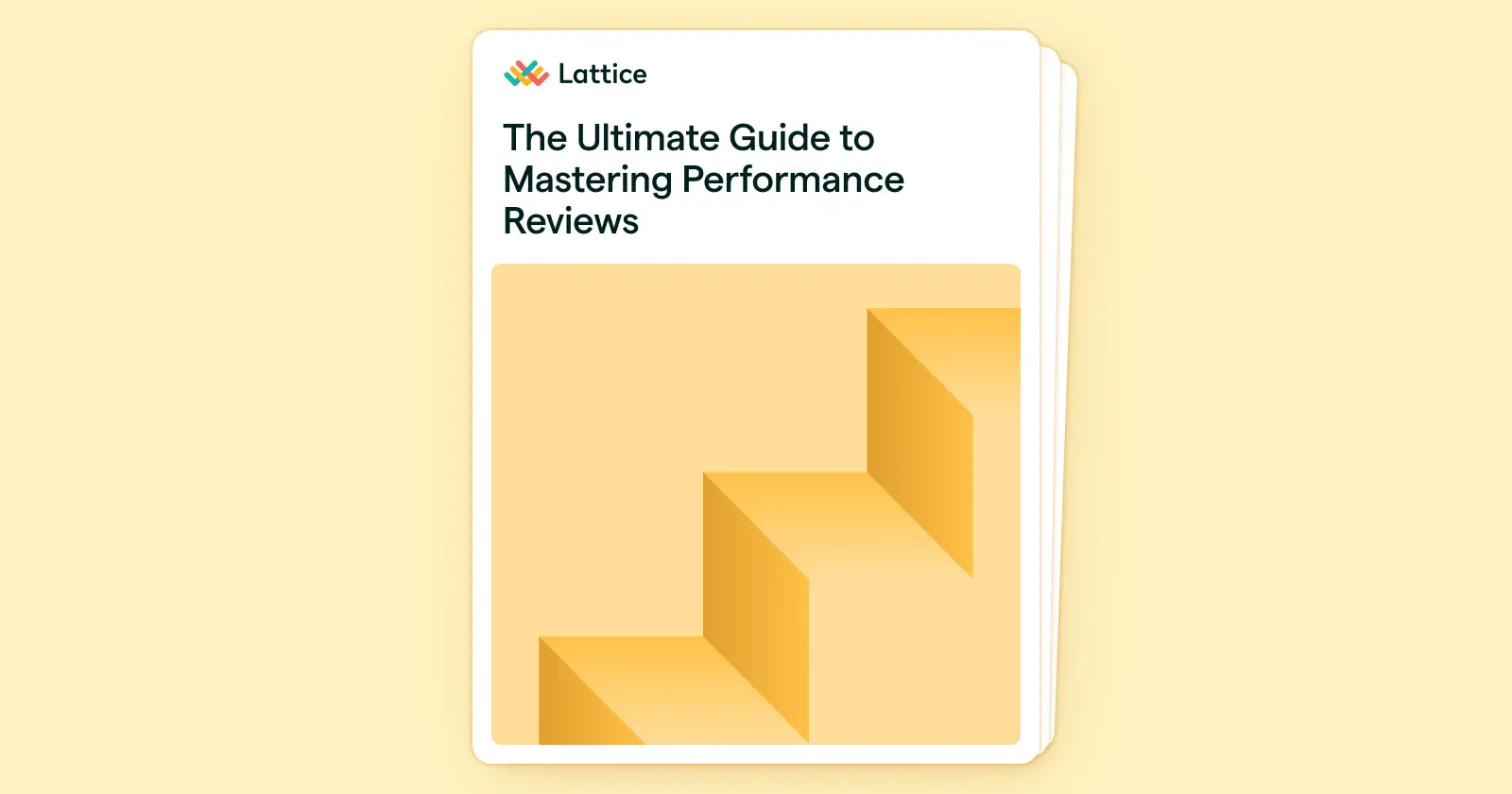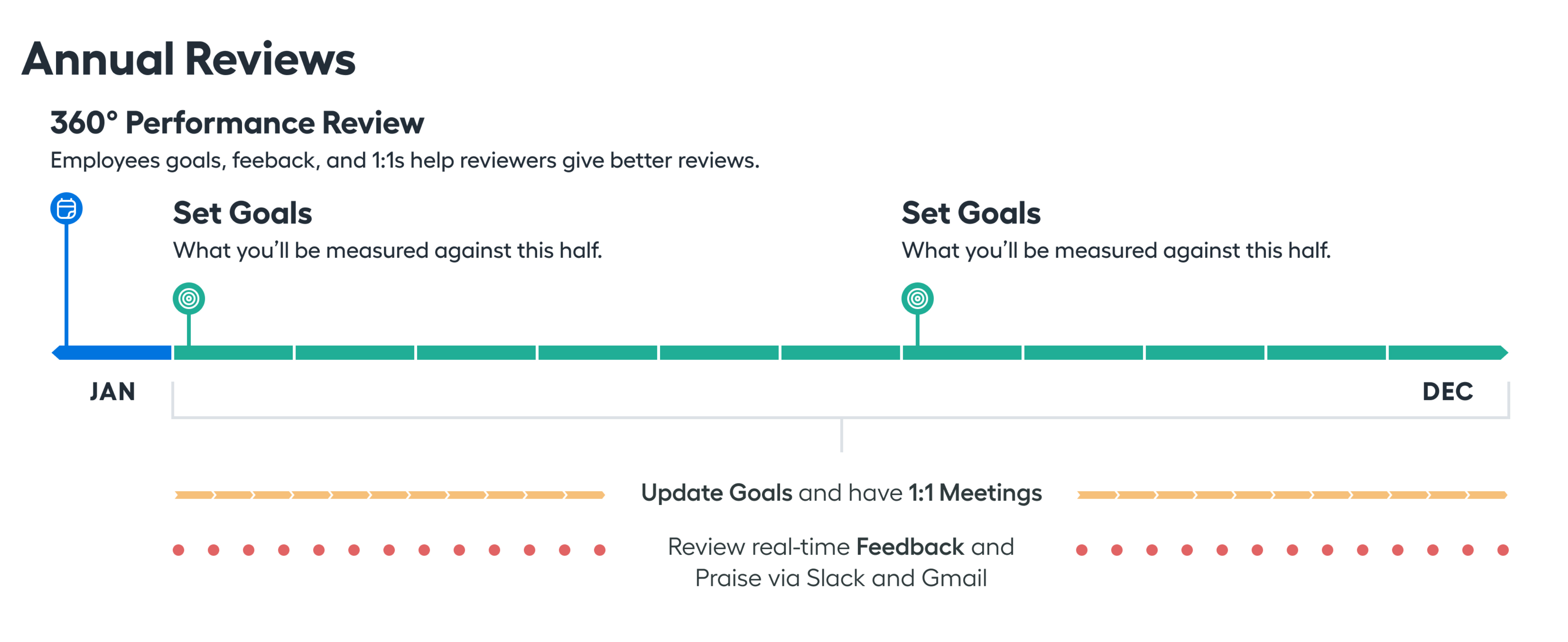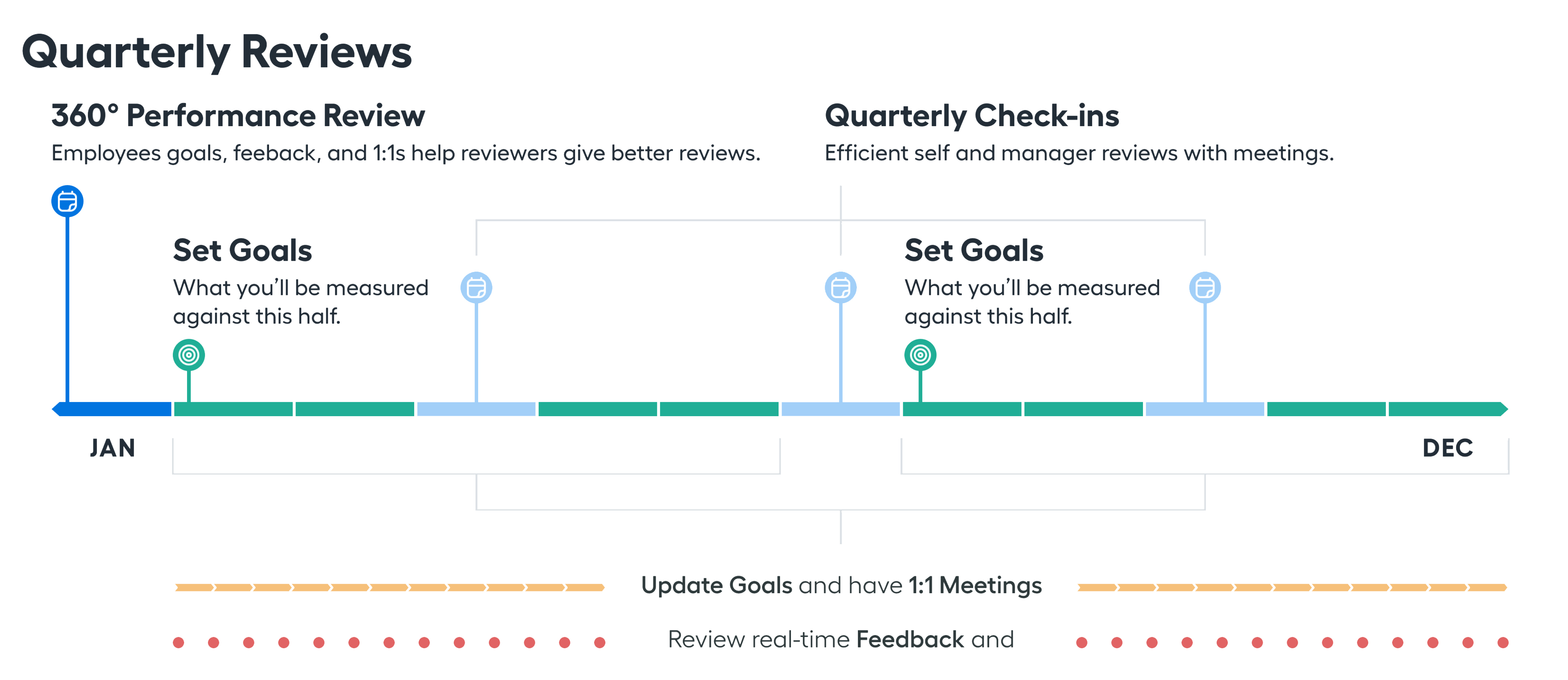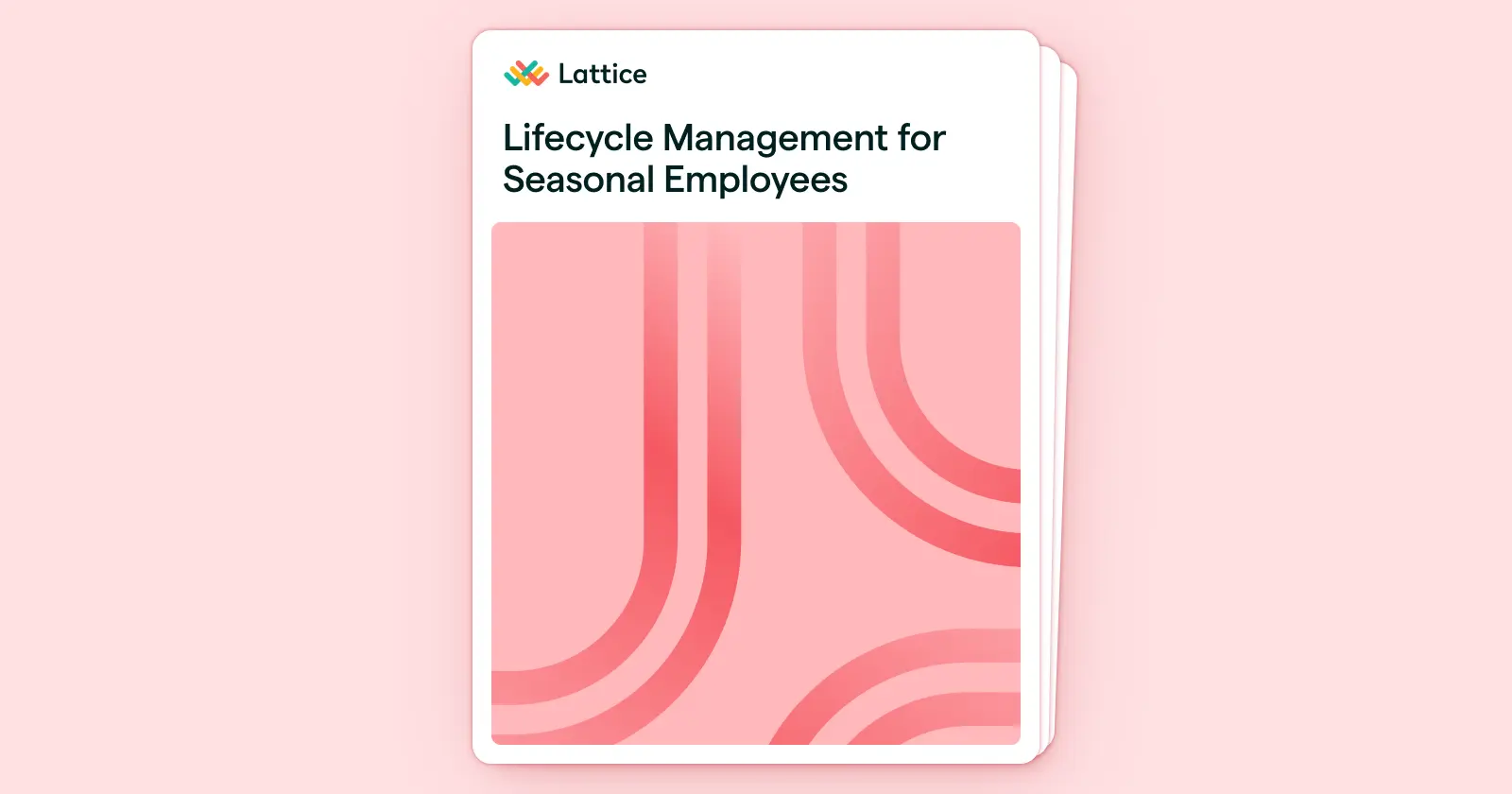The Ultimate Guide to Mastering Performance Reviews


Everything teams need to know to ensure reviews are effective and impactful, both for your employees and your business, and create a review process with clear objectives and less bias.
Download for free now
By submitting your information, you agree to Lattice's Terms of Service and Privacy Policy. You can opt out anytime.
Thanks! We'll be in touch soon.
The evolving labor market has launched performance management to the forefront of employers’ concerns as workers increasingly prioritize flexibility and professional development. In fact, in Lattice’s 2024 State of People Strategy Report, performance management ranked higher than ever among the most pressing human resources initiatives. For 38% of respondents, it was a top priority — a 40% spike from the year before.
And just as performance management takes on greater importance, so does the performance review. Today, these conversations are a critical touchpoint to ensure that performance management activities are productive and effective. This comprehensive guide is designed to help you master performance reviews and, in turn, ensure your team’s productivity and performance.
What is an employee performance review?
Performance reviews feature conversations between managers and their direct reports about the employee’s performance, goals, and needs. Managers typically review the employee’s past performance, based on metrics set during previous reviews, one-on-one conversations, and other regular feedback. Together, managers and their direct reports set goals for the coming year, built upon the employer’s business needs and the employee’s career ambitions. Compensation and promotion decisions may also be part of the discussion.
Why are performance reviews important?
Performance reviews are important because they help employers strategically align an employee’s performance with their career aspirations and the company’s goals, bolstering employee performance, productivity, and engagement. But, too often, employers do performance reviews wrong. Unfortunately, just 35% of organizations surveyed in WTW’s 2022 Performance Reset Survey said their employees believe their performance is evaluated fairly.
How often should you conduct performance reviews?
Some organizations only conduct annual performance appraisals. Elsewhere, semiannual and quarterly reviews make sense. The frequency of performance reviews varies among different organizations, depending on factors like the following.
- Organizational culture: In workplaces where direct feedback already occurs naturally, frequent employee evaluations may not be necessary.
- Manager-to-employee ratio: When the ratio is high, managers may not have enough time to provide more than an annual review for each employee.
- Length of employment: During their first year, employees may benefit from more frequent reviews to ensure they’re clear on expectations and aligned with the culture.
- Pace of growth: Employees at young organizations or fast-growing or changing companies may benefit from frequent check-ins to keep them informed and engaged.
While every organization differs, 2022 Workhuman data found the most common performance review cadence was quarterly or monthly, with annual performance reviews coming in second, and biannual coming in third.
The prevalence of quarterly reviews is a good thing for employee engagement. According to a 2021 study by Lattice, direct reports’ engagement levels are strongly correlated to the frequency of their performance reviews, with quarterly reviews yielding higher engagement scores than semi-annual reviews — and semi-annual reviews leading to higher scores than annual reviews.
Three Sample Review Cadences



Types of Performance Reviews
Effective performance reviews don’t just involve a sit-down between a manager and direct report. Adding additional employee appraisals like the following can ensure a holistic performance analysis.
1. Self-Assessment Review
In self-assessments, employees reflect on their accomplishments and areas of improvement. The exercise can provide them with some agency during the sometimes nerve-wracking review process as they consider their own performance and how to grow.
Of course, not every employee will have the internal motivation to think deeply about their progress. Self-assessments also can introduce some bias. For example, if an employee comes from a culture that values humbleness and deference, they may be less inclined to spend their entire self-review talking about their accomplishments.
When including self-reviews, managers or HR teams may need to coach employees on how to self-assess. Goal-tracking software like Lattice OKRs & Goals can help. With it, employees can update goal progress in real-time so they can quickly see which areas are on schedule, ahead of schedule, and lagging behind as they complete self-assessments.
Sample Self-Evaluation Questions
- To what extent did you meet your goals?
- What accomplishments are you most proud of?
- What is the company value that you best exemplified?
Download Lattice’s self-evaluation template for more.
2. Peer Assessment
With peer reviews, an employee’s team members evaluate their work. Peer reviews can bolster work relationships and reemphasize the importance of teamwork. But they also have the potential to introduce bias or deception into the system. A coworker with a grudge may not be truthful. Another, fearful of retaliation, may sugarcoat critiques.
Nurturing a culture of continuous feedback can help peers provide the right kinds of insights. And tools like Lattice make it easy for employees to share feedback in real-time, tracking performance year-round to improve productivity and engagement.
Sample Peer Evaluation Questions
- How has this person’s work impacted your ability to deliver on your goals?
- To what extent does this person follow through on team expectations?
- How would you rate this person’s communication and teamwork skills, and why?
Download Lattice’s peer review template for more.
3. 360-Degree Feedback
In a 360-degree review, an employee’s team members, colleagues, and subordinates share anonymous feedback about them. Because these individuals work with the employee in different capacities, they can build a balanced view of the person’s strengths and weaknesses.
On the other hand, particularly in teams without a culture of transparency, reviewers may focus too much on weaknesses and damage team morale. To avoid that downside, organizations should ensure that 360-degree review questions include queries about a colleague’s strengths.
Sample 360-Degree Feedback Questions
- What would you say are this person’s strengths?
- How often does this employee meet deadlines?
- How effectively does this individual communicate progress on team projects?
Download Lattice’s 360 performance review template for more.
The Key Players in Performance Reviews
The performance review process requires a team effort, and HR teams, managers, and employees all play a role. Here’s how the following key players are involved.
- HR Teams: People teams ensure that managers and employees have what they need to complete their performance review tasks, including training on how best to conduct unbiased assessments. They’re also tasked with analyzing performance review trends to discover new ways to boost performance, productivity, and employee engagement.
- Managers: Managers establish clear goals and objectives for their direct reports and collect relevant data to provide an accurate assessment of their overall performance. They also must ensure that employees have the information they need to do their part.
- Employees: Employees should approach performance reviews with an open mind and a desire to grow. They should understand how their objectives align with organizational goals and monitor their own performance throughout the year to ensure they remain on track.
Performance management tools, such as Lattice Performance Management, can support each stakeholder throughout the review cycle.
- For HR teams, it provides a customizable solution for building a company culture of continuous feedback and accountability.
- For managers, it makes it easy to discover how their team is performing in real-time, helping them become better coaches.
- For employees, the solution’s intuitive tools streamline the work required to communicate their progress, request performance feedback, and take ownership of their development.
8 Steps for a Successful Performance Review
An effective performance review requires a comprehensive understanding of employee, team, and organizational objectives, along with a candid conversation about how the individual is doing and what direction they’d like their career to take. These eight steps can ensure a productive process.
1. Prepare year-round.
Long before the review is scheduled, managers must collect relevant data and documents about their direct reports’ performance. That might include sales numbers for a sales team or the return on investment for the marketing team’s newest campaign. Performance management software can gather that information throughout the year, keeping a catalog of an employee’s accomplishments and progress on career goals.
As you prepare for the sit-down meeting, pull up your employee’s job description and objectives and compare them to their accomplishments. Choose specific performance criteria and competencies to define what you’ll focus on. Examples of key competencies include:
- Accountability and dependability
- Attention to detail
- Creative thinking
- Communication
- Leadership
- Problem-solving
- Teamwork
2. Communicate the schedule.
Clearly communicate the timing of an upcoming performance review meeting and give your direct reports about two to three weeks’ notice, so they have time to assess their own performance. Peers and 360-degree reviewers should receive similar notice as well.
HR teams and managers must ensure that everybody involved in the evaluation receives specific deadlines for review completion. Times should also be scheduled with managers at the end of the cycle to go over results with each direct report.
Throughout the process, be transparent about the purpose of the review and how it will be conducted. Regular reminders, such as through Lattice’s performance review software, can help ensure progress and maximize participation rate.
3. Kick off the review.
Anxieties can run high at the start of any performance review for managers and employees. Kick off any review with a positive and constructive tone. Go over the agenda, and let your employees know that your goal is to help them succeed. Encourage them to share their thoughts as well.
Use language like this: “You’ve done a fantastic job over the past six months. I’ve tried to reflect that in my comments, and also suggest some areas where you could further improve. I’m hoping that this review will be useful for helping you to reach the next step in your career.”
4. Assess performance.
Effective performance review comments are direct, comprehensive, and specific. As you assess their performance, provide specific examples to back up your claims and connect your employee’s actions to outcomes.
- Instead of saying: “You’re a good listener.”
- Try saying: “You listen effectively by taking notes during meetings and asking questions when needed.”
- Collect different feedback.
Managers provide written reviews to their employees, but other types of input can be helpful, too. Consider using the Likert scale to let peer or 360-degree reviewers select how much they either agree or disagree with a statement like “This employee works well with others.”
5. Lead an effective discussion.
To set the tone, let the employee present their own self-review first, and ask them if there is anything they’d like to focus on during the meeting. From there, ensure your feedback balances conversations about both strengths and weaknesses. Academic research suggests that constructive and positive feedback, when paired, may be more effective than constructive feedback alone.
So, be positive. Positive feedback can be a powerful motivation tool and lead to better outcomes. Use specific examples to highlight the employee’s performance in critical areas such as goal achievement, problem-solving, and communication.
When you offer constructive feedback, deliver it considerately and with specific suggestions for improvement. Avoid words like “always.” For example, instead of saying, “You’re always late,” say, “You’ve been late at least twice in the last six weeks.”
Listen actively. As an active listener during the review, make eye contact, respond to what they say, and ask questions. Make sure this is a two-way conversation. As you share feedback, be ready to take it, too. Head into the meeting with an open mind about how you and the organization can best support your employee.
Positive Feedback Examples
- This employee often asks for immediate feedback to clarify and ensure understanding.
- This individual regularly asks well-prepared or thoughtfully composed questions.
Constructive Feedback Examples
- This person seems to have trouble setting measurable goals that align with company strategic objectives.
- This employee struggles with adjusting their work in the face of a client’s changing needs.
Looking for more? Lattice covers effective performance review phrases to use — and which ones to avoid.
.jpeg)
6. Prepare for the future.
While performance reviews naturally cover an employee’s past performance, discussions about their future, including career development opportunities, are just as critical. Keep performance reviews future-focused.
Help them set SMART goals — specific, measurable, actionable or achievable, relevant or realistic, and time-bound objectives that address their strengths, weaknesses, and aspirations. Identify areas where employees can enhance their skills through learning and development.
And continuously emphasize that performance appraisals aim to help employees achieve their full potential. Offer your ongoing support and guidance.
7. Provide an accurate rating.
In addition to written reviews, some organizations rely on rating systems, often a three-point, five-point, or letter-grade format that ranks employees based on their performance.
Rating systems can supply valuable data about performance across an organization. Managers who have trouble talking to employees about performance and possible improvements often appreciate them. And some employees are motivated by them because they give a clear numerical goal to work toward.
But ratings can be subjective. One manager may rate top performers as a five, while another may rate employees at the same level as a three. Qualitative, descriptive ratings, such as “far exceeded expectations,” “consistently met expectations,” or “did not meet expectations” can be more effective than numbers alone.
8. Follow up.
Any employee performance conversation should be ongoing with periodic check-ins to ensure they’re on track with no roadblocks in their way. Find out if, for example, promised learning and development resources aren’t available or another team is slowing a project’s progress.
Follow-up is also crucial for employees with performance improvement plans (PIPs), which set goals aimed at bolstering an employee’s poor performance within a specified timeframe. PIPs often result after the official documentation of two repeat offenses and a conversation with the employee about the issue. PIPs can feel like punishment to workers, but they don’t have to be. When SMART goals, action plans, and specific deadlines are shared, managers give employees a clear playbook on how to change course.
Tips for Mitigating Bias in Performance Reviews
Our biases can easily creep into performance reviews. Affinity bias, for example, is when a manager prefers a direct report who has a similar background to their own. Confirmation bias might lead them to rely on preconceived notions, not facts.
Performance calibration meetings, which look across an organization at how individual managers are rating their direct reports’ performance, can root out prejudice. These meetings are meant to educate managers about their own biases so they can eliminate them from the review process. From there, calibration meetings ensure that managers across an organization are aligned on how low, mid-level, and high performers are rated and identified.
Performance management tools can also help, especially when they provide a real-time and objective record of an employee’s achievements and missteps across the review period. By incorporating that quantitative data and gathering input from a variety of voices for reviews, organizations can mitigate bias.
Tying Compensation to Performance
When tying compensation to performance, objectivity and fairness are crucial. Otherwise, managers may simply reward their favorite employees, nurturing a culture of unfairness. Organizations that have done the hard work to mitigate bias are in a better place to link pay and performance.
Compensation software solutions, such as Lattice Compensation, can also provide transparency behind merit increases by connecting performance ratings, benchmarks, and pay guidelines with an organization’s compensation process.
Choosing the Right Performance Review Software
The days of hastily documenting employees’ progress with pen and paper are long gone. Today, with employee engagement and performance management ranking top-of-mind for HR professionals, organizations are building comprehensive performance management processes and turning to performance review software to simplify the activities.
A single platform, in particular, can automate disparate performance evaluation processes, gathering the information into one spot for easy access. And a customizable solution can evolve with organizational changes, ensuring a consistent employee experience across a workforce as needs shift.
It’s no surprise that successful HR teams that are exceeding their goals are 2.6 times more likely to be using performance management software than the lowest performers are, according to Lattice’s 2024 State of People Strategy Report.
With HR tech tools like Lattice, employees can quickly compare their progress on goals with organizational objectives, and managers have a clear vision into how their team is performing in real-time to steer them back on course, as needed. And, with full visibility into performance management data, HR teams can demonstrate the clear links between HR and business outcomes, achieving alignment with C-suite objectives as they strengthen productivity and retention.

Mastering Performance Reviews With Lattice
Amid volatile markets and other fast-moving disruptions, HR teams, managers, and employees are juggling heavy loads. Holistic HR systems with robust performance management programs give them the boost they need, strengthening employee engagement, ensuring top performers stay on the job, and nurturing a company culture of continuous improvement that fosters success across the workforce.
Lattice supports that work with a flexible performance solution that allows teams to identify organizational goals, structure performance reviews around them, and reward employees in a fair and equitable way.
Ready to learn more? Request a demo to see Lattice in action.

Your people are your business
Ensure both are successful with Lattice.



